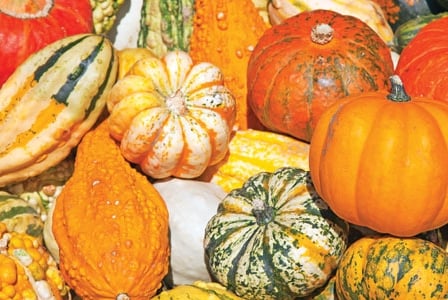
October features two events that focus on a healthy food supply: Organic Week, October 15 to 22, and Non-GMO Month, running the duration of October.
October features two events that focus on a healthy food supply: Organic Week, October 15 to 22, and Non-GMO Month, running the duration of October.
Not only do these events call attention to the health of our food system, but they also celebrate the abundance and quality of sustainably grown food.
Growing demand for organics
The demand for organic food continues to rise. In 2006 organic sales reached $1.2 billion, and by 2008 the figure nearly doubled, to $2 billion. “We’ve got such a vibrant, dynamic, quickly growing sector, one that’s offering such incredible opportunities. We just want policy-makers to know that—and we want consumers to know about that,” says Matthew Holmes, executive director of the Canada Organic Trade Association.
This year Organic Week will celebrate with events across the country—neighbourhood dinners, movie showings, cooking demonstrations, farm tours. It’s a chance to focus on how our food is grown and to use that information to make healthy choices.
Consumers question designer genes
The safety of genetically modified organisms (GMOs) continues to be debated. Polls have found that consumers want to know if they’re buying genetically modified food and that many wish to avoid GMOs altogether. A Consumers Union poll found that two-thirds of consumers who buy organic are concerned about the possibility their food is contaminated with GMOs.
“Our customers were very concerned about the issue and wondered what steps we were taking and what our knowledge base was,” says Patrick Connor of Toronto’s Big Carrot Natural Food Market. Whether or not consumers are comfortable with genetically modified foods in their diets, they have the right to know and the right to choose, Connor points out.
To address customer concerns, the Big Carrot Natural Food Market joined forces with two US retailers, the Natural Grocery Company and Good Earth Organic & Natural Foods. Together they founded the Non-GMO Project, which maintains a registry of products that meet set standards for GMO content, verified by a third party. Their “Non-GMO Project Verified” seal signals that, while an item may not be completely GMO free, it has met the organization’s standards.
The movement toward healthier food has come a long way, and this month, with events across Canada, we can celebrate the progress that’s been made. To participate in the celebrations, check out event listings at Organic Week, organicweek.ca, and at the Non-GMO Project, nongmoproject.org/non-gmo-month/.
Finding organic and non-GMO foods
The following organizations provide information about where to find organic and non-GMO foods. You can also ask at your local farmers’ market or health food store.
- Canadian Organic Growers—contains a directory of organic producers across Canada – cog.ca
- Canada Organic Trade Association—contains a listing of Canadian retailers in its Organic Pages directory – ota.com
- Farmers’ Markets Canada – farmersmarketscanada.ca
- The Non-GMO Project—lists participating retailers – nongmoproject.org
Setting the standard
It wasn’t too long ago that the term “organic” was open to interpretation, and consumers didn’t have much information about whether they were buying genetically modified food. Today, through the cooperation of the food industry and government, a food labelled organic or non-GMO meets set standards.
Organic
Organic farming produces food sustainably, without the use of herbicides, antibiotics, synthetic hormones, genetic modification, or cloning. Organic products are made with very little processing and without preservatives, artificial ingredients, or irradiation.
As of 2009, any item that claims to be organic must meet federal Organic Products Regulations. Consumers now have the assurance that when they’re buying a product carrying the “Canada Organic” logo, they’re buying a certified organic product.
GMO
A genetically modified organism (GMO) is a plant or animal that has had its genes altered by human intervention. Unlike the natural genetic changes that occur with interbreeding, pollination, or even mutation, it takes a laboratory to produce a GMO.
The idea behind this technology is to modify or add desirable characteristics to a plant or animal. One example is a vitamin A-fortified rice variety that could help prevent blindness in Third World countries. The concern, however, is that there has been insufficient research to establish the safety of GMOs for the health of humans or the environment.
GMOs already on the market include corn, soybeans, sugar beets, and alfalfa—products commonly used in processed foods.



